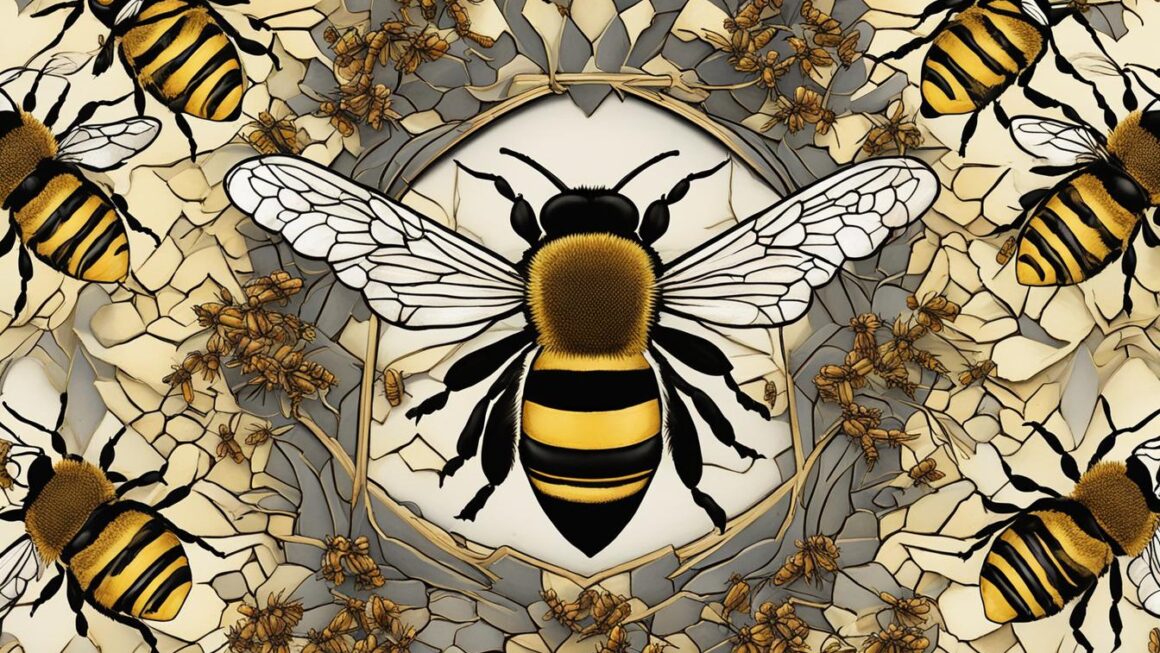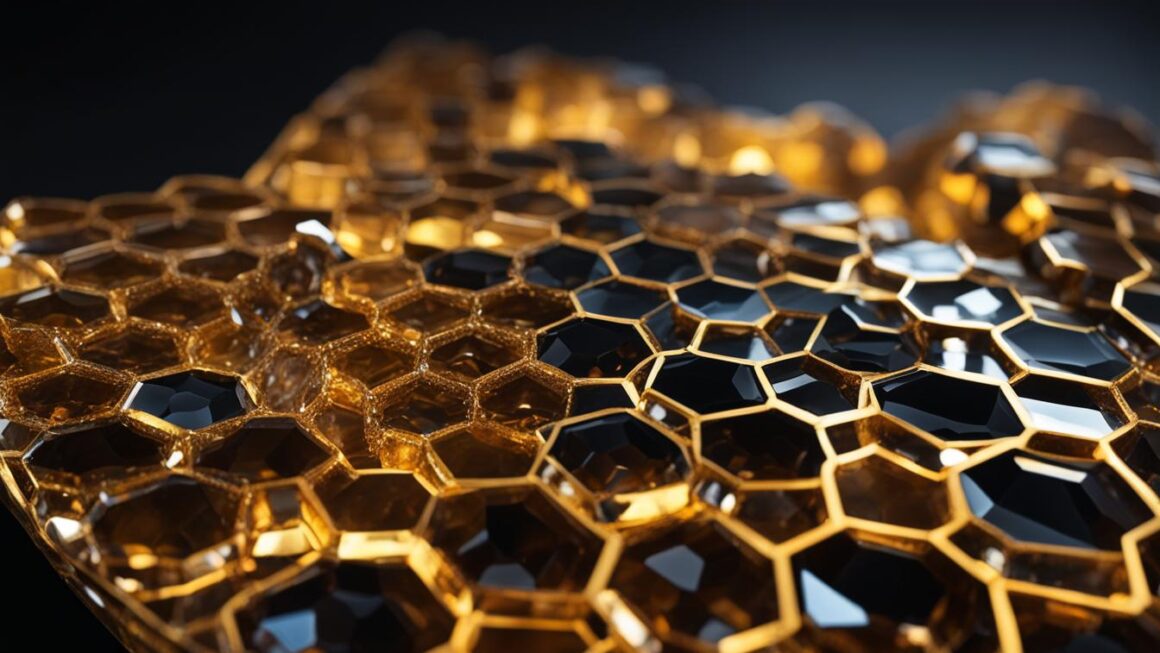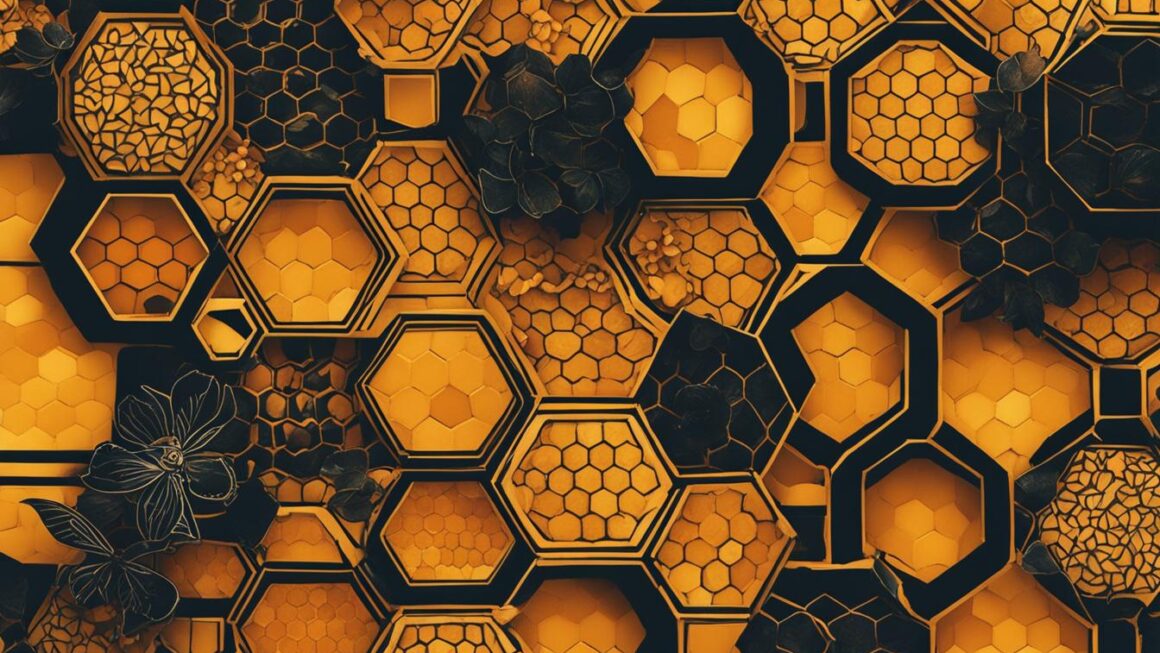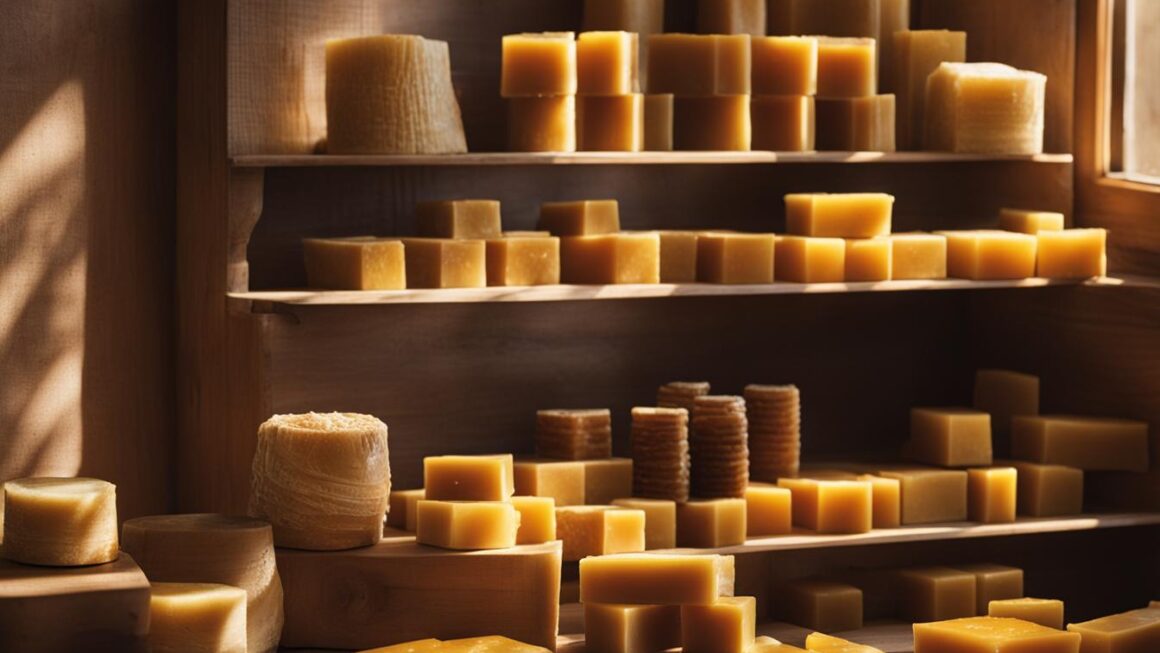Queen bees are a vital component of a successful beekeeping operation. The cost of a queen bee can vary based on factors such as the type of bee, season, location, and supplier. It is important to research and find a reliable supplier. Breeding queens can also be a popular activity for beekeepers. Keeping queens healthy and productive is crucial for a strong and productive bee hive.
Key Takeaways:
- Queen bee prices can vary depending on factors such as bee type, season, location, and supplier.
- It is important to find a reliable supplier when purchasing a queen bee.
- Breeding queens can be a popular activity for beekeepers.
- Investing in quality queens is essential for the success of a beekeeping operation.
- Queen bees play a crucial role in the health, productivity, and stability of a bee colony.
Factors Affecting the Cost of Queen Bees
When considering the cost of queen bees, there are several factors that can influence pricing. These factors include the type of bee, the time of year, the location, and the supplier. Different breeds of bees may have varying levels of demand and availability, which can impact their price. Additionally, queens with desirable breeding characteristics, such as disease resistance or high honey production, may command a higher price due to their increased value to beekeepers.
The time of year can also affect the cost of queen bees. Spring is typically the busiest season for beekeepers, as they prepare their hives for the upcoming honey production. During this time, the demand for queen bees is high, which can result in higher prices. On the other hand, during the winter months, when beekeeping activities are reduced, the cost of queen bees may be lower.
Location is another factor that can impact the cost of queen bees. Prices may vary depending on the region and the availability of local suppliers. Transporting queen bees over long distances can also incur additional costs, such as shipping fees, which should be taken into consideration when purchasing a queen bee.
Choosing a reliable and reputable supplier is crucial when buying a queen bee. It is important to research and find a supplier who provides healthy and high-quality queens. By considering these factors and making informed decisions, beekeepers can ensure that they are getting the best value for their investment in queen bees.
Table: Factors Affecting the Cost of Queen Bees
| Factor | Description |
|---|---|
| Type of Bee | Different bee breeds may have varying levels of demand and availability, influencing their cost. |
| Time of Year | During busy seasons, such as spring, the cost of queen bees may be higher due to increased demand. |
| Location | Prices may vary depending on the region and availability of local suppliers. |
| Supplier | Choosing a reliable supplier is crucial to ensure the purchase of healthy and high-quality queen bees. |
Average Price Range for Queen Bees
When it comes to the cost of queen bees, the average price range typically falls between $25 and $40. However, it’s important to note that the price can vary depending on certain factors such as the type of bee, availability, and supplier. Queens with desirable breeding characteristics or specific traits may command a higher price, ranging from $70 to $200 or more. It’s worth considering these factors when budgeting for queen bee purchases.
It’s important to keep in mind that the average price range mentioned does not include shipping costs. Shipping queen bees can be a delicate process that requires special packaging and handling to ensure their safe arrival. Shipping costs can vary depending on the distance and shipping method chosen, so it’s advisable to factor in these additional expenses when planning your beekeeping budget.
Comparative Queen Bee Prices:
| Breed | Average Price |
|---|---|
| Carniolan | $25-$45 |
| Italian | $30-$50 |
| Russian | $40-$60 |
| Buckfast | $50-$70 |
Please note that the table above provides a general idea of the average price range for different bee breeds. Prices may vary depending on the supplier and specific breeding characteristics of the queens.
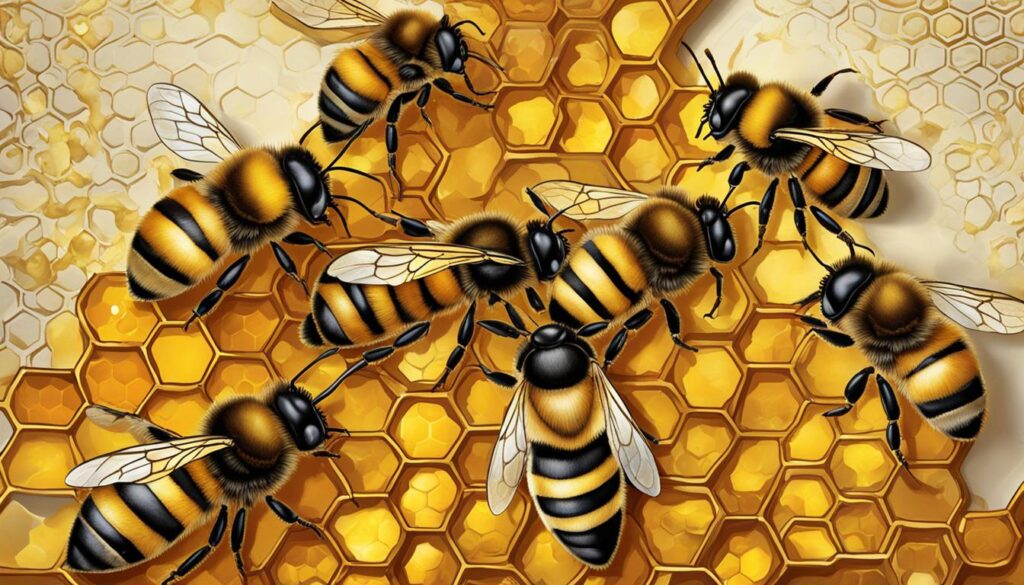
“Investing in high-quality queens is crucial for the success of a beekeeping operation. These queens contribute to the overall health, productivity, and stability of a bee colony, making them well worth the investment.” – Beekeeping expert
Factors Influencing Queen Bee Prices:
- Type of bee breed and lineage
- Availability and demand
- Season and timing
- Supplier reputation and quality
Considering these factors and understanding the average price range for queen bees can help beekeepers make informed decisions when purchasing queens for their hives. Whether buying queens to replace aging or declining ones or introducing new genetics to improve traits, investing in quality queens is essential for the success of a beekeeping endeavor.
The Importance of Investing in Quality Queens
Investing in quality queens is crucial for the success of a beekeeping operation. High-quality queens contribute significantly to the health, productivity, and stability of a bee colony. They possess desirable traits such as disease resistance, honey production, and overall hive performance, making them invaluable assets to beekeepers.
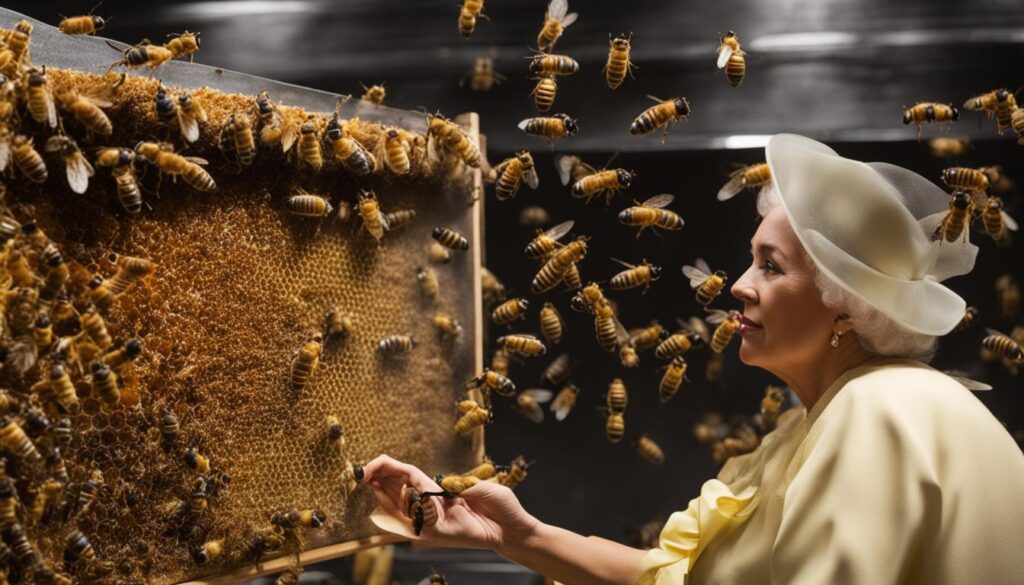
When purchasing queen bees, it is important to find a reputable supplier who specializes in breeding and supplying high-quality queens. A reliable queen bee supplier will ensure that the queens are healthy, well-mated, and free from any diseases or genetic issues. They will have a thorough understanding of different bee breeds and be able to provide guidance on selecting the most suitable queen for your specific needs.
By investing in quality queens, beekeepers can ensure the longevity and productivity of their bee hives. These queens are more likely to produce strong and thriving colonies, resulting in increased honey production and overall hive success. Additionally, investing in quality queens minimizes the risk of introducing weak genetics or diseases into the bee colony, which can have detrimental effects on hive health and productivity.
Breeding Your Own Queen Bees
One popular activity among beekeepers is breeding their own queen bees. Breeding queens allows beekeepers to replace aging or unhealthy queens in their hives, as well as create surplus queens to sell. However, breeding queen bees requires knowledge, expertise, and the necessary resources to ensure successful mating and production.
When breeding queen bees, beekeepers need to consider the cost of production. This includes factors such as establishing and maintaining breeding colonies, acquiring quality breeding stock, providing proper nutrition, and managing mating and breeding operations. These costs can vary depending on the scale of the breeding operation and the resources available.
The market price for queen bees that are bred and sold can also vary. It is influenced by factors such as demand, availability, and the reputation of the breeder. Beekeepers who successfully breed and produce high-quality queens with desirable traits may be able to command a higher market price for their queens, while those with less desirable traits or unknown breeding origins may have to adjust their prices accordingly.
Benefits of Breeding Your Own Queen Bees
- Control over queen quality and genetics.
- Cost savings in the long run.
- Ability to select for desirable traits.
- Potential for selling surplus queens.
While breeding your own queen bees can be a rewarding endeavor, it is important to note that it requires time, effort, and expertise. Beekeepers considering breeding should thoroughly research and educate themselves on best practices, consult experienced beekeepers or breeding associations, and be prepared to invest in the necessary resources and equipment.
| Cost Factors | Market Price Range |
|---|---|
| Establishing and maintaining breeding colonies | $500 – $1,000+ |
| Acquiring quality breeding stock | $100 – $300 per queen |
| Nutrition and management | $100 – $200+ |
| Mating and breeding operations | $200 – $500+ |
“Breeding your own queen bees allows for greater control over queen quality and genetics, providing an opportunity to select for desirable traits and potentially save costs in the long run.”
Overall, breeding your own queen bees can be a fulfilling and cost-effective option for beekeepers who are willing to invest the time and resources required. It offers the ability to have control over queen quality, genetics, and the potential to contribute to the overall improvement of the beekeeping industry through the production of high-quality queens.
Understanding Queen Bee Lifespan and Productivity
Queen bees, the central figures in a bee colony, play a vital role in maintaining the hive’s productivity and growth. Understanding their lifespan and productivity is crucial for beekeepers seeking to ensure the long-term success of their beekeeping operations.
A queen bee’s lifespan can extend up to 7 years, with her most productive years occurring in the middle of her life. During this period, she can lay an impressive number of eggs, averaging up to 1,500 per day. This prolific egg-laying contributes significantly to the bee colony’s overall development and productivity. However, as the queen bee ages, her productivity may decline, triggering the colony to replace her with a new queen.
“A queen bee can live up to 7 years, with her most productive years being in the middle of her lifespan.”
As the queen bee ages, beekeepers may notice a decrease in her egg-laying rates and overall performance. This decline in productivity can be attributed to various factors, including a decrease in sperm quality, the accumulation of pesticide residues, or genetic characteristics that affect her ability to produce eggs efficiently.
To maximize the productivity and longevity of a bee colony, beekeepers must carefully monitor their queen bee’s performance. Regular observation and evaluation will help determine when it’s necessary to introduce a new queen to maintain optimal productivity within the hive.
By understanding the lifespan and productivity of queen bees, beekeepers can make informed decisions about managing their hives. Monitoring and replacing aging queens when necessary ensures the continuous success and growth of the bee colony.
Where to Buy Queen Bees
When it comes to purchasing queen bees, there are several options available to beekeepers. Local beekeepers, beekeeping associations, and online bee farms are all potential sources for acquiring these crucial insects. Each option has its advantages and considerations, and it’s important to choose a reputable supplier who can provide healthy and high-quality queens.
Local beekeepers are a valuable resource for beekeepers looking to buy queen bees. They may have surplus queens available for sale, allowing for a more direct and personal transaction. Additionally, purchasing from local beekeepers supports the local beekeeping community and can foster connections with experienced beekeepers who can provide guidance and advice.
Beekeeping associations often have resources and networks that can help beekeepers connect with reputable queen bee suppliers. These associations can provide recommendations and guidance on finding reliable sources. Attending beekeeping conferences or workshops hosted by these associations can also offer opportunities to meet suppliers and learn more about purchasing queen bees.
Online bee farms have become increasingly popular options for purchasing queen bees. They offer convenience and the ability to browse a wide range of options from the comfort of your own home. Many online bee farms also provide next-day shipping, ensuring that the queen bee arrives promptly. However, it’s important to thoroughly research and choose a reputable online supplier to ensure the health and quality of the queen bee.
| Supplier | Advantages | Considerations |
|---|---|---|
| Local Beekeepers | – Personal transaction – Support local beekeeping community – Access to experienced beekeepers |
– Limited availability – May not have specific breeds |
| Beekeeping Associations | – Recommendations and guidance – Networking opportunities – Access to trusted suppliers |
– Limited availability – Potential membership fees |
| Online Bee Farms | – Convenient – Wide range of options – Next-day shipping |
– Research to find reputable suppliers – Shipping costs |
Choosing the right supplier is crucial when buying queen bees. It’s important to consider factors such as reputation, customer reviews, and the health of the bees provided. Verifying the supplier’s practices, including breeding and shipping methods, can help ensure the overall success of introducing a new queen bee into the hive.
Benefits of Buying Queen Bees
Buying queen bees offers several benefits for beekeepers. Firstly, it allows for the introduction of new genetics into a hive. This is important for maintaining the health and vitality of the colony. By bringing in queens with desirable traits such as disease resistance and honey production, beekeepers can improve the overall performance of their hives. The new genetics also help to prevent inbreeding, which can lead to weakened and less productive colonies.
Secondly, buying queen bees ensures the timely replacement of aging or declining queens. As queen bees age, their productivity may decline, and they may become less effective at laying eggs and leading the colony. By purchasing queens, beekeepers can easily replace old or failing queens and keep their hives strong and productive. This helps to maintain the overall health and stability of the colony.
Lastly, purchasing queens can be a convenient option when a colony is in need of a new queen quickly. In some cases, a colony may unexpectedly lose its queen or the queen may become unproductive. By buying a queen bee, beekeepers can quickly introduce a new queen to the colony and prevent any disruption in hive activity. This is particularly important during critical times such as honey production or when the colony is preparing for winter.
Table: Comparing Benefits of Buying vs. Breeding Queen Bees
| Benefits of Buying Queen Bees | Benefits of Breeding Queen Bees | |
|---|---|---|
| Introduction of new genetics | Yes | Yes |
| Timely replacement of aging queens | Yes | Yes |
| Convenience and speed | Yes | No |
| Control over breeding and traits | No | Yes |
| Availability of surplus queens for sale | Yes | Yes |
“Buying queen bees offers the advantage of introducing new genetics into the hive, ensuring timely queen replacement, and providing convenience in emergency situations. Breeding queen bees, on the other hand, allows for greater control over breeding and trait selection. Both options have their benefits, and ultimately, it depends on the beekeeper’s goals and resources.”
In summary, buying queen bees provides beekeepers with the opportunity to improve the genetics of their hives, replace aging or declining queens, and quickly address any queen-related emergencies. While breeding queen bees offers more control over traits and breeding, it requires significant knowledge and resources. Ultimately, the decision to buy or breed queen bees depends on the individual beekeeper’s preferences and goals.
Conclusion: The Value of a Queen Bee in Beekeeping
Queen bees are indispensable assets in the world of beekeeping. Their significance cannot be overstated as they impact the overall health and productivity of a bee colony. Whether considering the costs or benefits, understanding the value of a queen bee is vital for successful beekeeping.
While the cost of a queen bee varies, investing in high-quality queens is paramount. These queens possess desirable traits such as disease resistance and superior honey production, ensuring the prosperity of the entire hive. Whether purchasing from reputable suppliers or breeding your own, prioritizing the value of these key players in the beekeeping industry is crucial.
Queen bees are not merely replaceable individuals; they are the lifeblood of a colony. Their longevity and productivity influence the health and growth of the hive. When considering the value of a queen bee, it becomes evident that they are more than just a cost; they are an investment in the success of a beekeeping operation.
FAQ
What factors affect the cost of queen bees?
The cost of queen bees can be influenced by factors such as the type of bee, the time of year, the location, and the supplier.
What is the average price range for queen bees?
The average price range for queen bees is typically between $25 and $40. However, queens with desirable breeding characteristics can be priced higher, ranging from $70 to $200 or more.
Why is it important to invest in quality queens?
Investing in quality queens is essential for the success of a beekeeping operation. High-quality queens contribute to the health, productivity, and stability of a bee colony.
How can I breed my own queen bees?
Breeding your own queen bees requires knowledge, expertise, and the necessary resources to ensure successful mating and production. It can be a popular activity among beekeepers.
How long does a queen bee live?
A queen bee can live up to 7 years, with her most productive years being in the middle of her lifespan. As she ages, her productivity may decline, and the colony may eventually replace her with a new queen.
Where can I buy queen bees?
Queen bees can be purchased from various sources, including local beekeepers, beekeeping associations, and online bee farms.
What are the benefits of buying queen bees?
Buying queen bees allows for the introduction of new genetics into a hive, ensures timely replacement of aging or declining queens, and maintains the overall health and productivity of the hive.
What is the value of a queen bee in beekeeping?
Queen bees play a crucial role in the success of a beekeeping operation. Their health, productivity, and overall well-being influence the entire hive.

